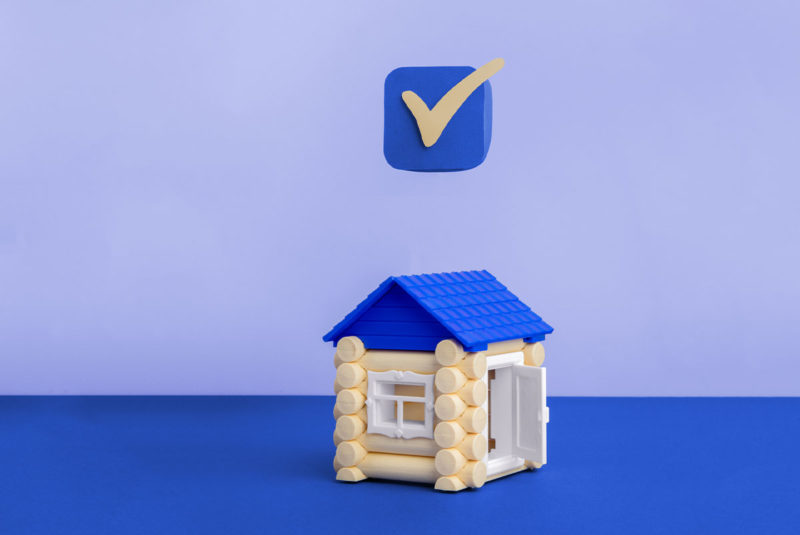Ready To Buy a Home?
Get Approved to Buy a Home
Rocket Mortgage® lets you get to house hunting sooner.
As a first-time home seller, you may be a bit anxious or confused about why a buyer might be quiet after the home inspection. Did they back out and not say anything? Should you look for a new buyer? How long does the buyer have to respond?
All of these are valid questions and we’re here to ease your mind as you move forward in your selling journey.
What Sellers Should Know About Home Inspections
When you first bought your home, you may remember that after the seller accepted your initial purchase offer, you scheduled a home inspection. This inspection is usually paid for by the buyer and is a chance for them to get a personal assessment of the property.
Getting this personal assessment allows a buyer to see what they might be taking on in terms of repairs and maintenance, even if they are purchasing the home as-is. The buyer’s agent is sometimes present during the inspection and the buyer is welcome to join as well.
As the seller, you and your listing agent may or may not be present – it will depend on the buyer’s choice. They may like having you there to answer questions, or it may make them feel more uncomfortable. Talk with them to see what will work best.
What is a home inspection contingency?
A home inspection contingency in the sales contract is a key factor that could affect how soon you might hear back from a buyer.
A home inspection contingency clause can be added to your sales contract that allows the home buyer to make their final purchase offer based on the home inspection report. It gives the buyer and seller a period of time to negotiate any repairs or purchase conditions based on what the home inspector found.
Typically, you have a 10-day inspection period (contingency period) that allows for these negotiations to take place. But you’ll want to check with your real estate agent to see what it is for you as it can vary depending on your agreement.
This contingency also protects the buyer from losing their earnest money if they decide to walk away from the sale based on what was found during the inspection. Knowing what the buyer is allowed to walk away from may help you decide how you want to negotiate.
Why Would a Buyer Not Respond After an Inspection?
So let’s assume the home inspection is over and you’re waiting on the buyer to respond … but it’s just crickets on the other end. It might feel like not hearing back from the buyer is a bad thing, that they’ve decided to walk away. Truly ghosted you. 👻
You should hear from the buyer within 7 – 10 days after the home inspection, but check with your real estate agent before assuming they’ve vanished. Your inspection deadline could be different. Be patient and know that if you haven’t heard from them yet, it could be one of three things.
They’re accepting the property as-is
If the buyer doesn’t respond to an inspection or submit an addendum requesting repairs within the contingency period, it usually means they plan to accept the property as-is.
The buyer has the option to either notify you, saying that they accept the property as-is, or they can simply not respond at all. Either way, the ball is in their court.
Not hearing from them usually means they accepted the condition of the home, not rejected it. So don’t worry if it’s getting close to the inspection deadline and you haven’t heard from them yet.
They’re reviewing the inspection report
If it’s still within the contingency period and you haven’t heard from the buyer yet, this could be because they are reviewing the inspection report and deciding what their next move is.
Inspection reports are lengthy documents that take time to comb through, so don’t get discouraged if the buyer hasn’t spoken up yet. They may be looking to schedule additional inspections, extend the inspection deadline or decide what repair requests they want to make.
They’re preparing to make repair requests
If the buyer has decided to request repairs based on what came to light during the home inspection, they will have to make their requests during the contingency period. Which means, if you haven’t heard from them yet, it might also be because they are creating a repair addendum and working with contractors to budget for repairs.
What Happens If a Buyer Requests Repairs?
During the contingency period, a buyer can submit a repair addendum requesting repairs, which you, the seller, can decide to accept, negotiate or deny.
Since the buyer paid for and owns the information in the inspection report, the seller can ask for a copy to check that the repairs requested match the details in the inspection report. A seller is not entitled to a copy of the report unless it was added as a clause in your contract.
When a buyer submits a repair addendum, the seller is not obligated to respond, and the buyer can’t submit additional requests until you do respond.
But be aware that there are some state-mandated nonnegotiable repairs like fixing smoke detectors, railings or other retrofit items that sellers are required to address. Talk with your real estate agent to see what these necessary repairs are in your state. Also, check the addendum for any repairs that might be in your best interest to fix or negotiate.
Reasonable repair requests
Some of those repairs in the addendum that might be in your best interest to fix are called reasonable repair requests. These are repairs that a buyer is within reasonable grounds to request and are usually health or safety concerns.
Some reasonable repair requests include:
- Certain building code violations (like HVAC or electrical systems that don’t function properly)
- Major health concerns (like lead paint, fire hazards, pests, mold or asbestos)
- Major structural issues (like water damage and foundation or roof problems)
There are some unreasonable repairs that you may want to deny or not respond to such as repair requests for cosmetic fixes and normal wear and tear. Since these are more of an inconvenience for the buyer and don’t impact the function and value of the home, you shouldn’t feel obligated to fix them.
How long does a seller have to respond to repair requests?
If you want to respond to the buyer’s repair addendum, you usually have 3 days to do so – it depends on what you agreed on in your inspection contingency. You have the option of accepting, denying or negotiating.
The buyer then has 3 days to respond to your counteroffer, and so on, until you reach a final offer before the contingency period closes.
You may also decide that instead of making repairs, you negotiate a lower sale price or repair credit (money you would give the buyer as a credit toward closing costs that is meant to help with repair costs).
You want to make sure you’re being thorough in your negotiations, but it’s always in your best interest to respond at your earliest convenience. You can ask to extend the contingency period if you aren’t able to come to an agreement quickly.
How Long Does a Buyer Have to Back Out After an Inspection?
Buyers have until the end of the contingency period to back out of the sale or risk losing their earnest money. A buyer likely won’t want to face this situation so give them time to respond. Just be aware that if the buyer wants to back out they have to let you know – because not hearing from them means acceptance.
Remember that a buyer can back out after the contingency period. But they would be subject to any penalties laid out in the contingency clause for not following the contract terms, like losing their earnest money.
No News Is Usually Good News
It may seem counterintuitive that if you haven’t heard from the buyer yet after the home inspection it’s actually a good sign. But if you’re still within your inspection contingency period, the buyer is likely figuring out how they want to move forward with the sale.
On the other hand, if the buyer wants to back out of the sale, they must let you know before the contingency period is up or they risk losing their earnest money.
Whether your inspection contingency period is the typical 10 days or you’ve agreed upon a different time period in your contract, have patience. Because no news is usually good news.
Ready to make a change?
Whether you want to buy a house, refinance or take cash out, you’re not alone. The experts are just a click away.
The Short Version
- If the buyer doesn’t respond to an inspection or submit an addendum requesting repairs within the contingency period, it usually means they plan to accept the property as-is
- You should hear from the buyer within 7 – 10 days after the home inspection, but check with your real estate agent before assuming
- Buyers have until the end of the contingency period to back out of the sale or risk losing their earnest money




